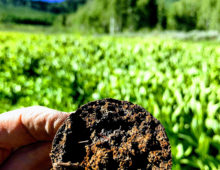Genomic Variation in Mustard Family Metabolism
Studies of genomic variation are critical to developing a synthetic, systems and quantitative understanding of how to improve crops. However, modern short-read methodologies may actually miss the very genes that are critical to adapting crops to new environments or making them healthier. This project will create high-quality genomes of multiple crops and species from the mustard family to test new methods and technologies to ensure that these genes essential for adaptation and improvement are identified. [Read More]
